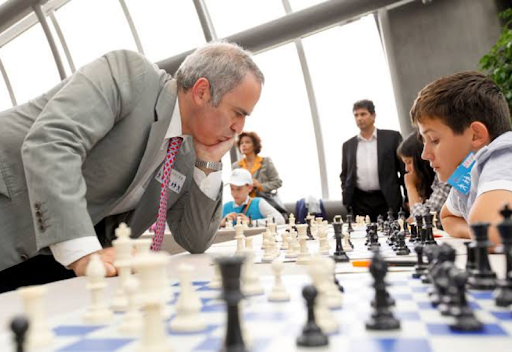Imagine two grandmasters locked in an epic chess battle with no time controls—it could last for eternity! Without a ticking clock, who knows when it would end?
Time controls add the perfect balance of urgency and strategy, making sure the game doesn’t drag on and stays fair. Whether you’re casually playing or competing in tournaments, mastering time controls is just as important as mastering your moves.
In this blog, we’ll explore the most common chess tournament time controls in FIDE-rated games, their significance, and how they impact chess strategy and gameplay.
Overview of Standard Time Controls in Chess
Chess tournament time controls are the backbone of competitive play. They dictate the pace of the game, ensuring players manage their time efficiently while making strategic decisions. Whether it’s a high-stakes World Championship match or a casual weekend tournament, time controls shape the flow and intensity of each game.
Without them, chess games could easily stretch for hours or even days! Let’s explore how different time controls create a fair and dynamic playing environment for everyone, from beginners to grandmasters.
Commonly Used Formats in FIDE-Rated Games
Time controls are the foundation of modern chess tournaments. The idea is simple: each player has a set amount of time to make all their moves. The beauty, however, lies in the variety of time control formats that offer unique challenges and require different strategies.
In FIDE-rated tournaments (organized by the International Chess Federation), time controls typically range from standard formats to more rapid ones. The most common formats include:
- Classical time controls: Typically lasting several hours, allowing deep calculation and strategic planning.
- Rapid: Fast-paced games that still allow for some strategic depth.
- Blitz: Speed chess, often forcing players to rely on intuition.
- Bullet: The quickest format, where games are usually finished in under 3 minutes.
The chess tournament time allotted varies based on the format and level of competition, with classical formats being the gold standard for professional tournaments.
Typical Structure of Time Controls in Standard Chess Tournaments
In most standard chess tournaments, each player is given 90 minutes for the first 40 moves, followed by an additional 30 minutes for the remainder of the game. This structure allows players to manage their time over a long, strategic game without rushing through critical decisions. Along with this, players typically receive a 30-second increment per move, ensuring they don’t lose due to time alone if they can move quickly enough.
This system has become the standard across many FIDE-rated tournaments as it provides a balanced approach, allowing ample time for calculation while maintaining a competitive pace.
As you familiarize yourself with the different time controls in chess, you can appreciate how each format challenges players in unique ways—whether it’s the slow, deep calculations of classical chess or the fast-paced thrill of blitz and bullet games. Understanding these time structures is key to excelling in tournaments and improving your strategic thinking under pressure.
Caissa School of Chess can help you master these time formats with personalized coaching that aligns with your goals, whether you’re gearing up for classical tournaments or sharpening your skills in blitz.
FIDE Time Controls: The Official Standard
Time controls in chess are not arbitrary; they are carefully regulated to ensure fairness and challenge for players. FIDE (Fédération Internationale des Échecs), the global chess governing body, sets the official standards for time controls in tournaments worldwide. Whether you’re competing in a local tournament or watching the World Chess Championship, FIDE’s regulations ensure consistency in how time is managed. These rules help maintain the balance between speed and strategy, allowing for deep thinking while keeping the game engaging.
Explanation of FIDE’s Role in Time Control Regulation
FIDE, the world’s governing body for chess, plays a significant role in establishing and regulating chess tournament time controls. The federation sets the standards for how time should be managed in official tournaments, ensuring consistency and fairness across competitions worldwide. Their regulations govern everything from World Championships to local tournaments, providing a unified framework that players can expect no matter where they compete.
Standard Time Control: 90 Minutes for the First 40 Moves + 30 Minutes
The most common time control in FIDE tournaments is 90 minutes for the first 40 moves, followed by an additional 30 minutes after the 40th move. This ensures that players have sufficient time to think during the early and middle stages of the game, where strategic planning is critical.
30-Second Increment Per Move for Smoother Gameplay
In addition to the basic time controls, most tournaments also employ a 30-second increment per move. This ensures that players don’t run out of time during endgame situations and prevents the dreaded “flag-fall” in positions that could otherwise be drawn or even won.
Major Tournament Time Controls: How Big Events Do It
When it comes to the highest level of chess, such as the World Chess Championship or major FIDE events, time controls are designed to push players to their limits, both mentally and physically. These longer time controls allow for deep calculations, strategic planning, and positional play, all while ensuring players maintain a healthy pace. In these tournaments, time management becomes just as important as understanding the chessboard, making every second count in the pursuit of victory.
Specific Time Controls Used in Major Events Like the World Championship
Major tournaments like the FIDE World Chess Championship take time controls a step further. These prestigious events often employ a slightly more complex structure to ensure that players have the time needed to make every move count.
In these events, players are typically allotted:
- 120 minutes for the first 40 moves
- 60 minutes for the next 20 moves
- 15 minutes for the remainder of the game, with a 30-second increment per move starting from move one.
This format is designed to test a player’s endurance, strategic depth, and time management over long, grueling matches.
Importance of Time Controls in Deciding Game Outcomes
In tournaments like the World Championship, time controls often play a crucial role in deciding outcomes. The psychological pressure of managing your time while making critical decisions can lead to mistakes, even at the highest levels. Players must balance between using their time wisely for calculation and keeping enough time in reserve for the latter stages of the game.
Time Control Methodologies: From Sudden Death to Increments
Different time control methodologies add layers of complexity and excitement to chess tournaments. These methods not only influence how games are played but also test a player’s ability to manage time under various pressures. From the high-stakes tension of Sudden Death to the more forgiving Increment system, each methodology brings its own challenges, requiring players to adapt their strategies accordingly. The choice of time control often depends on the format and intensity of the tournament, ensuring that no two games are ever the same.
Overview of Different Methodologies Such as Sudden Death and Increment Formats
There are several methodologies used in managing chess tournament time:
- Sudden Death: Players have a fixed amount of time for the entire game, with no additional time added. If a player runs out of time, they lose the game. This format is rare in classical chess but commonly used in rapid and blitz games.
- Increment: The most popular method in FIDE-rated tournaments. Players receive a small increment (e.g., 30 seconds) after every move, ensuring they have time to complete the game even if they run low on time.
Detailed Explanation of the Fischer Time Delay and Its Impact
Named after the famous American chess player Bobby Fischer, the Fischer Time Delay is another popular methodology. In this format, players receive a certain delay (e.g., 5 seconds) before their clock starts counting down on each move. The key difference from the increment format is that no additional time is permanently added to a player’s clock—only the delay exists before time begins to decrease.
The Fischer Delay is particularly useful in faster formats like blitz, where players can make quick moves without immediately losing time off the clock.
Mastering different time control methodologies is essential for any chess player aiming to compete in tournaments. Whether it’s managing the intensity of Sudden Death or utilizing the flexibility of the Increment system, understanding these formats can make or break your performance in a game. If you’re ready to sharpen your time management skills and dive deeper into tournament play, Caissa, the AI-personalized chess coach by CircleChess, can help you understand and practice these time formats, helping you stay composed under pressure.
GM Vishnu (former coach of Gukesh) is starting a new batch at Caissa in just 2-3 days—don’t miss the chance to learn from the best. Enroll now before the slots fill up and start your journey towards mastering time controls and tournament success!
Impact of Time Controls on Gameplay
Time controls play a crucial role in shaping the dynamics of chess games, impacting how players approach each move. They influence the speed of decision-making, depth of calculations, and even how players manage their mental energy throughout the game. Whether it’s a long classical game or a fast-paced blitz match, different time controls push players to adapt their strategies, balancing between precision and efficiency. Understanding how to handle time pressure can often be the difference between victory and defeat in competitive chess.
How Different Time Controls Influence Player Strategies
Time controls have a direct impact on how players approach the game. In classical formats, players can take their time to calculate multiple variations and strategize deeply. However, as time controls shorten (like in rapid or blitz), players often rely more on intuition, pre-calculated opening systems, and tactical awareness rather than deep strategic planning.
Effects of Increments and Delays on Decision-Making
The addition of increments or delays affects a player’s decision-making process. While increments provide some breathing room, they can also tempt players to spend too much time early on, thinking that they will make up the time later. Delays, on the other hand, require faster decision-making since the clock doesn’t stop adding up after each move.
Comparison with Other Time Limits: Rapid, Blitz, and Bullet
While standard chess time controls offer players plenty of time to think deeply about each move, shorter formats like Rapid, Blitz, and Bullet provide a fast-paced, adrenaline-fueled experience. These faster formats test a player’s intuition and ability to make quick decisions under pressure.
The challenge with these time limits is balancing speed with accuracy, as players have significantly less time to calculate, often relying on pattern recognition and instinct. Understanding the differences between these formats and standard time controls is essential for players who want to compete in both casual and professional settings.
Differences Between Standard and Other Chess Formats Like Rapid, Blitz, and Bullet
Beyond the standard chess tournament time controls, faster formats like rapid, blitz, and bullet provide unique challenges:
- Rapid: Typically ranges from 10 to 60 minutes per player. This format encourages faster decision-making while still allowing some room for strategic play.
- Blitz: Players usually have 3-5 minutes for the entire game. This format is fast-paced, often requiring players to rely on their intuition.
- Bullet: Each player gets less than 3 minutes. Bullet chess is lightning fast and heavily based on instinct, often resulting in chaotic, tactical battles.
Importance of Standard Time Controls for Professional Tournaments
While faster formats are fun and adrenaline-pumping, standard time controls are essential for professional tournaments. They allow for a deeper understanding of positions and highlight players’ strategic skills over tactics, making them the preferred choice for prestigious events like the World Championship.
Wrapping Up: The Significance of Standard Time Controls in Chess
Standard time controls provide a balanced framework for players to showcase their skills without rushing through the game. Whether it’s the structured 90 minutes for 40 moves in a classical tournament or the more complex increments seen in world championship matches, these time controls are crucial for maintaining fair and competitive gameplay. They allow players to think strategically while still putting the pressure on when needed.
As the chess world evolves, we may see further innovations in time control methodologies, but one thing is certain—the need for standardized systems will always remain. Whether you’re training for your next tournament or sharpening your skills, mastering time controls is a vital part of becoming a strong player.
If you’re looking to fine-tune your time management skills or improve other aspects of your game, Caissa School of Chess can aid you in your goal. Their expert coaches can help you master the intricacies of chess, from openings to endgames, and guide you on how to best handle time controls in tournaments. So, which time control do you find most challenging in your games? Let Caissa help you conquer it!





